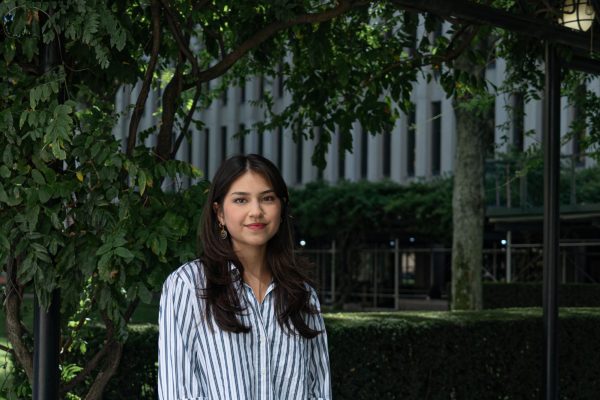In “Kiyawat V. God,” a woman stands trial before a jury for skinning her friend alive. But if the play sounds grueling, and its setting conventional, you have the wrong idea.
In this Fordham Studio Theatre show, playwright Leela Kiyawat, Fordham College at Lincoln Center (FCLC ) ’25, and director Fabiola Arias, FCLC ’24, take the familiar structure of the courtroom drama and give it a surreal, playful new language. The titular character Kiyawat, played by Emily Miteli Bongoy, FCLC ’27, and her lawyer, played by Elian Rivera, FCLC ’25, are not up against your typical judge and jury. They stand trial in the court of God, pleading for the salvation of Kiyawat’s soul in light of her crime and making their case directly to the audience.
But Kiyawat has not committed just any crime; she has committed a crime against a white girl, the type of case the court pays special attention to. Marilyn Mary Mary-Anne, played by Olivia Rain McCarthy, FCLC ’28, was “ethnically Polish, and a bit French if you squint your eyes” before Kiyawat cut off her skin to use as a mask.
As the play’s foundation is shaken, so are its systems of morality — religious, legal and social.
As for Kiyawat’s ethnicity? “Only God knows the answer to that question,” the defense said in the play. Before a sharp and hilarious panel of divinely ordained judges, Trudy Cohen, FCLC ’27, Phia Funicello, FCLC ’27, and Isabella Gallegos, FCLC ’25, order crumbles.
When writer Leela Kiyawat began drafting the screenplay for her thesis four years ago, she drew from her experience growing up Indian-American in a predominantly white suburb of Los Angeles.
“I felt from a young age this need to assimilate,” Kiyawat said. “I remember as a child feeling how violent those needs were. There was something visceral about wanting to replace my skin with my best friend’s skin; replace my hair with my best friend’s hair.”
The world of the play seems ordinary enough at first, subduing the brutal narrative thrust. The courtroom, designed by Natalie Foo, FCLC ’25, is pristine. The clothing, designed by costume designer Teri Salmon, FCLC ’26, is professional, and the use of legal jargon is copious. The setting gradually deteriorates into a dimly-lit, otherworldly realm abundant with gore, designed by lighting designer Tian Yi, FCLC ’27.
As the play’s foundation is shaken, so are its systems of morality — religious, legal and social. Heaven and hell are merely known as “up” and “down.” Kiyawat’s lawyer argues his client was moved by the “violence of assimilation” that made her overwhelmingly envious of her white friend. Chaos crescendos in a scene so riotous that God herself shows up to intervene, played to charismatic perfection by Alexandra Aurora Pupo, FCLC ’26.
Kiyawat knew she wanted to play on the surreality of judicial bureaucracy after digging into public-access court transcripts from Dobbs v. Jackson, the Supreme Court case that eliminated the federal right to abortion. She also cites her introduction to absurdist theater as a major inspiration.
“Supreme Court cases, the United States, the justice system and plays like Caryl Churchill’s ‘Top Girls’ were all in my head at the time,” she said. “I decided to combine the courtroom drama with my experience with racialized assimilation in the United States.”
There is no question that Kiyawat has skinned Marilyn. Instead, it begs the more complex question: Who and what is truly to blame?
Post-colonial writers Frantz Fanon and Edward Said are referenced in the playbill. In the character of Kiyawat, we get a dynamic picture of a young woman fighting for her pride against the forces of racial and cultural assimilation. The subversion of the courtroom drama in “Kiyawat V. God” cleverly dodges the genre’s usual focus on dispute. There is no question that Kiyawat has skinned Marilyn. Instead, it begs the more complex question: Who and what is truly to blame?
Once God enters, audience members submit paper ballots for or against Kiyawat’s salvation. God converses with the house as she sorts the votes and ultimately throws out the verdict. In such an irreverent show, it should be no surprise that the simple “guilty” or “not guilty” binary is not observed.
By breaking the fourth wall, the show gave agency back to the audience and encouraged them to engage with the themes.
“Usually we get some gasps and some uncomfortable giggles at first, because people are not used to being allowed to participate in a show,” Kiyawat said. “That’s the most fun part of the play for me, is actually when it goes off the script.”
At the show on April 25, the audience voted 20-14 to send Kiyawat “up.” Instead of heeding the jury’s decision, God instructed Kiyawat to go back to Earth and start life over again in a poignant monologue on the cyclical nature of mortal life. “My people are citizens of skin … Be careful with yourself,” God tells Kiyawat.
“Kiyawat V. God” concluded its sold-out run at the Veronica Lally Kehoe Studio Theatre on April 26.


